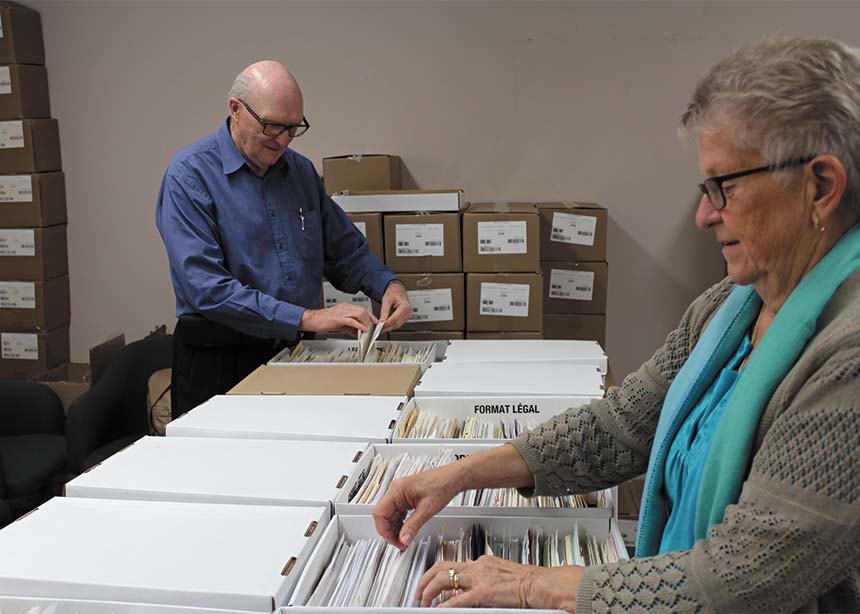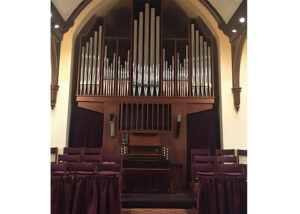Thousands of files languish in the basement of Mennonite Church Canada’s Winnipeg office, holding decades of history but forgotten by many. Irene and Jack Suderman are bringing these records to light, reviewing and organizing them to be stored in the Mennonite Heritage Archives (MHA).
The Sudermans live in Ontario, where they attend First Mennonite Church in Kitchener, but they came all the way to Winnipeg to participate in the two-month project. Since Sept. 30, the couple has been moving materials from filing cabinets to boxes, from binders to folders, sorting, labelling and summarizing the contents.
The key is to organize the files according to the administrative structure of the organization, Jack says. As former general secretary of MC Canada, his knowledge of the system assisted the process.
“When a system is under stress, the first thing that suffers is record keeping,” says Conrad Stoesz, archivist at the MHA, who is working with the Sudermans on the project. When MC Canada underwent a major downsizing in 2017, many staff didn’t have time to clean up their files, which were added to decades of other unprocessed records, he says.
It is a huge project and it would take Stoesz years to work through the records in addition to his regular workload. The archivist is grateful to the Sudermans for volunteering their time. Jack and Irene have worked in the Mennonite church for almost all of the 56 years they have been married, so they come to the task with extensive knowledge of the church’s inner workings. In addition to Jack working in conference leadership, they served with the General Conference’s Commission on Overseas Mission in South and Central America between 1980 and 1996. In 2017, they did a similar archival project with Mennonite Central Committee Bolivia.
Despite their familiarity with church history, they are learning new things with each box they open. The other day, Jack unearthed a complete hand-written Chinese translation of John Howard Yoder’s The Politics of Jesus from 1988. They also discovered a Korean translation of an Anabaptist Mennonite Biblical Seminary leadership curriculum. Both were copy ready but may have never been printed.
They found dozens of resources on calling pastors, leadership-training programs and church-planting initiatives. While many of the initiatives didn’t necessarily last long, Jack says it was encouraging to be reminded of the church’s capacity. “These signals of a church very alive, a church that is creative and alive and energized,” he says. “It’s quite inspiring to see what all was tested.”
Irene says these valuable resources are languishing, neglected, when there is still so much of them that could be of use. “We only need to access them to help us understand where the conversations were then and how they can help us today in a very different context,” she says.
It’s also important to make this information accessible so that people, especially seniors, can access it for research and use it to document their own stories “and help us to make history come alive,” she adds. “Both of us really feel that we have so much to learn from what has been and how can that inspiration continue to guide us and shape us as a church.”
“We’re not only interested in what happened in the past, we’re interested in what’s happening now,” Jack says. “But very often what’s happening now can only be explained by what was. You can’t really understand what is happening now without seeing how we got there. That’s a key piece of archival work.”
After sorting and naming every file, the Sudermans will summarize the contents of each box, noting who created the material and why they did it. Stoesz will digitize that information and enter it into the MHA’s online system, so the material is searchable.
“We talk about how God is moving within congregations and within conferences, within people’s lives here and where mission workers are working,” Stoesz says. “We talk about how society has changed and the pressures on the church and denominations. Over time, those pressures change and that’s all reflected in those records. For the church, history is necessarily theology. By keeping this stuff we are documenting God’s work in the world.”
This article appears in the Nov. 8, 2021 print issue, with the headline “Digging into the past.” Do you have a story idea about Mennonites in Manitoba? Send it to Nicolien Klassen-Wiebe at mb@canadianmennonite.org.







Leave a Reply
You must be logged in to post a comment.